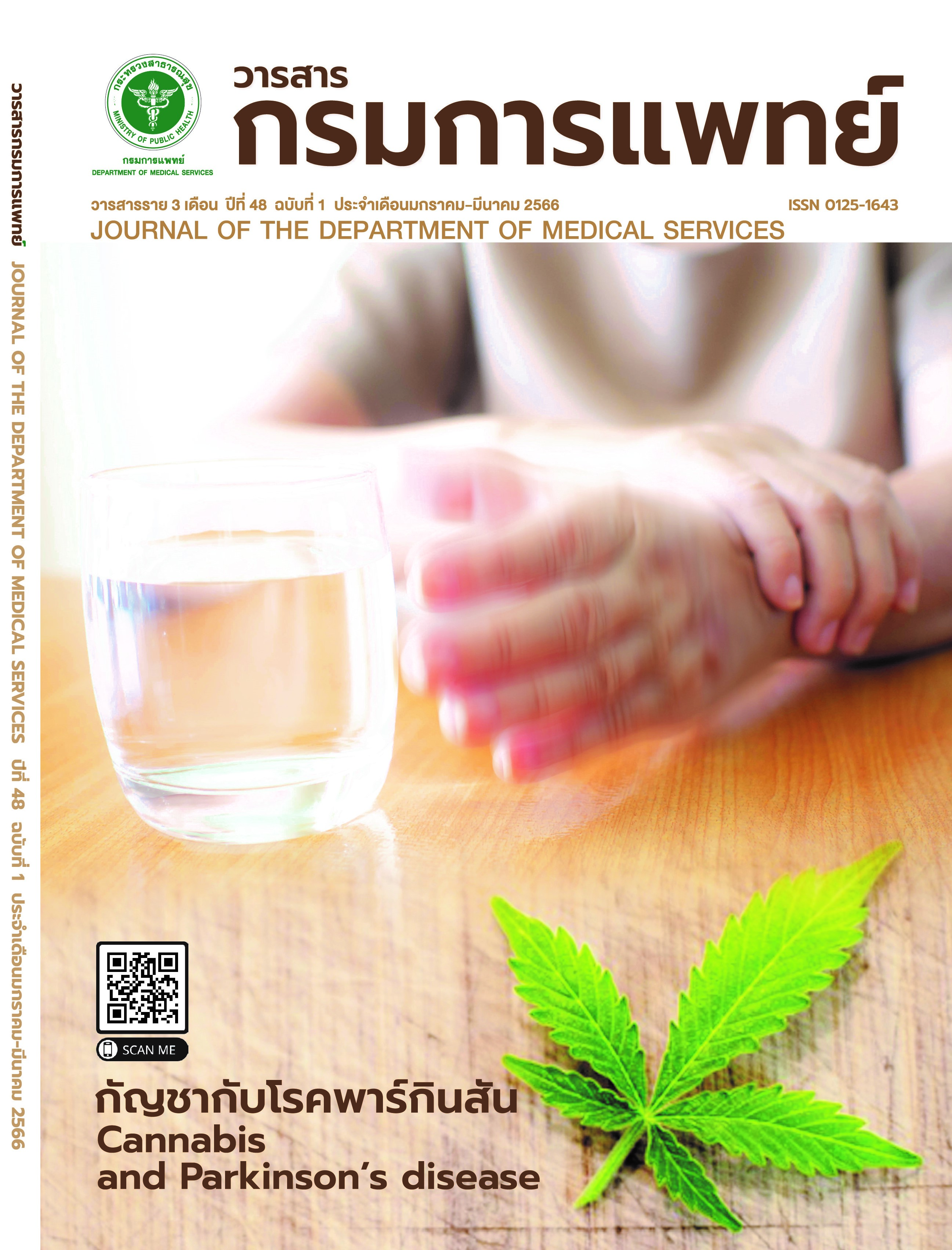Effectiveness of Development of Health Literacy through Controlled Transformative Learning due to Control Addictive Behavior among Methamphetamine Addiction Patients: Addiction Services-center in Department of Medical Services, Thailand
Keywords:
Health Literacy Program, Transformative Learning, Methamphetamine Addictive Behaviors, Addiction Services-CenterAbstract
Background: Health literacy is the cognitive and social skills that affect a person’s motivation and ability to access, understand, and use information to promote and maintain health. It is one of the main strategies of the Ministry of Public Health. Objective: To develop and study the effects of a health literacy development program through transformative learning for changes in drug addiction behavior. Methods: It was a developmental research consisting of 4 phases including 1) to study the situation of health literacy and literature review for the program development 2) to create the development program 3) to conduct a quasi-experimental research to study the effect of the program on methamphetamine-addicted patients 4) to study the feasibility of implementing the program to routine work. Chi-Square, Fisher’s exact, paired t-test, independent t-test, and repeated ANOVA were used to analyze data. Results: 1) Methamphetamine-addicted patients had the mean scores for all aspects of health literacy at a moderate level. The ages of the patients were younger. There were changes in the nature of methamphetamine use, In addition, there were more psychological complications. 2) The health literacy program consisted of 6 activities. 3) After the experiment, the experimental group’s mean scores on health literacy, quality of life, and intention to drug avoidance were higher than those before the experiment. and were significantly statically higher than those in the control group. Additionally, after one month of follow-up, 100% of the experimental group did not have substance abuse. 4) Patients and nurses were highly satisfied with the program. It is possible to implement such a program in routine work. Conclusion: Health literacy development programs can transform methamphetamine addiction behavior. Therefore, nurses should gain knowledge and skills about substances health literacy provided through a transformative learning process and implement it in patients with substance abuse.
References
World Drug Report. Executive summary policy implications.[internet] 2021. [cited 2022 Feb 5]. Available from: https://www.unodc.org/unodc/en/ data-and analysis/ awdr-2021_booklet1.html
Kanato M, Leyatikul P. Report on the results of a householdsurvey to estimate the population of substance abusers inThailand in 2019. Charansanitwong 2019.
Degan TJ, Kelly PJ, Robinson LD, Deane FP. Health literacy insubstance use disorder treatment: A latent profle analysis.J Subst Abuse Treat 2019; 96:46-52.
Dobson KS. Handbook of cognitive behavioral therapies. TheGuilford Press 1988.
Nutbeam D. Health Literacy as a public health goal: a challengefor contemporary Health education and communicationstrategies into the 21st century. Health Promot. Int 2000; 15:259-67.
Sørensen K, Van den Broucke S, Fullam J, Doyle G, Pelikan J,Slonska Z, et al. Health literacy and public health: a systematicreview and integration of defnitions and models. BMC PublicHealth 2012; 12:80.
Mezirow J. An overview on transformative learning. In IllerisK.(Ed.), Contemporary theories of learning. Rout ledge 2009;90-105.
Sodadis S, Puttachard T, Ratanaphan K, Yedama N. Developmentof a quality of life measurement in heroin, methamphetamineand marijuana addicts. Thanyarak Songkhla Hospital 2009.
Suwanchinda P, Suttarangsee W, Kongsuwan V. Developmentand Psychometric Evaluation of Intention to Drugs AvoidanceScale (IDAS) for Thai Adolescents. Nurs Sci J Thail 2019; 37:4-17.
Yalom ID. The theory and practice of group psychotherapy(4th ed.). Basic Books 1995.
Division of Nursing, Offce of the Permanent Secretary Ministryof Public Health. Roles and duties of professional nurses. SuaTawan Publishing House 2018.
Sarichevin P. Development of a learning model to promotehealth using Thai wisdom and Transformative learning processfor at-risk people of lifestyle diseases. Dissertation for thedegree of doctor of philosophy program in non-formaleducation. Chulalongkorn University 2015.
Wiwangsu P. Development of a transformative learning modelfor alcoholic rehabilitation treatment. Dissertation for thedegree of doctor of philosophy program in non-formaleducation. Chulalongkorn University 2012.
Inkochsan M. Participation action research to develop mediumand communication strategies for reducing harm from injectingdrug. Doctor of Sciences degree (Applied Behavioral ScienceResearch). Srinakarinwirot University 2008.
Lin LC, Huang CM, Hsu HP, Liao JY, Lin CY, Guo JL. Integratinghealth literacy into a theory-based drug-use prevention program:a quasi-experimental study among junior high students in Taiwan.BMC Public Health. 2021; 21:1768.
Downloads
Published
How to Cite
Issue
Section
License
Copyright (c) 2023 Department of Medical Services, Ministry of Public Health

This work is licensed under a Creative Commons Attribution-NonCommercial-NoDerivatives 4.0 International License.
บทความที่ได้รับการตีพิมพ์เป็นลิขสิทธิ์ของกรมการแพทย์ กระทรวงสาธารณสุข
ข้อความและข้อคิดเห็นต่างๆ เป็นของผู้เขียนบทความ ไม่ใช่ความเห็นของกองบรรณาธิการหรือของวารสารกรมการแพทย์



